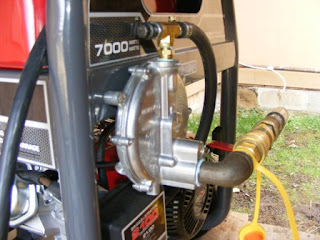I'm a fan of electricity. Most people tend to take it for granted. When we moved back to this area in 1996, we lived in a house without "real" electricity. Even in our "new and improved location" we are just a snow or ice storm away from being powerless. We only live 7 miles from the county seat but the power line comes to a dead end about two miles further up our road. There are exactly 4 houses past ours so those folks are more "dead end" than we are. Needless to say when the power goes out there are not a lot of people to complain.
Power outages in winter are interesting. We have had two very major ones in the last 10 years. Both lasted more than a week. One resulted from a devastating ice storm that hit the region and the other was a heavy wet snow that hit just before Christmas, 2009. That one that resulted in a very unfortunate series of events. One power line to the east of our house broke under the weight of snow. A short time later, a huge tree branch in our yard came crashing down on the lines. This snapped the power pole behind the goat barn resulting in the power pole and transformer punching through the roof. Luckily the goats were in an adjacent section of the barn. For days, power company folks came rolling up to our relatively secluded farm in 4x4 trucks with chains...to take pictures and then leave. Huh? Come back!! Finally on Christmas Eve a crew from Maryland spent the day mounting a new transformer on the remains of our pole we affectionately called “stubby”. The lines barely cleared the metal roof of our little barn but hey, at least we had electricity. It would be months later before a new pole could be installed.
 |
| Transformer hanging inside the barn. |
Being self-reliant types, we have always had our portable Honda generator gassed up and ready (mostly) on our front porch. We run it enough during power outages to keep our freezer and fridge cold. If it is not sub-freezing, much of the fresh food goes out on the porch into the great outdoor refrigerator. However, the advancing age of our generator (25+ years), coupled with the need to now power two fridges, two freezers, the all-important furnace blower plus the availability of free gas led me to consider alternatives. We aren't so power hungry that we feel the need to power our house 24/7 if the power goes out. We have two back-up heating systems (gas space heaters and wood), a gas range to cook on and various gas lanterns and oil lamps. We just wanted a reliable source of power to power our pump periodically and a way to preserve our food. We concluded that an automatic standby generator was more than we needed and was expensive. However, I was tired of having various extension cords strung through the house and out the windows. I needed a compromise.
We settled on a portable Briggs and Stratton 7000 watt generator with a natural gas conversion kit. The base generator came with an electric start, battery and trickle charger. It turns out that the conversion kit company, U.S. Carburetion, is located right here in good ol' West Virginia and it is actually manufactured here too! The generator would be connected to our service panel via a 30 amp cord. I ordered the generator and the kit and had it shipped to our local whiz-bang make-or-fix-anything guy who would install the kit, then bring the generator to our house for installation. It did cross my mind that I might never see the generator I had so generously ordered and had shipped to someone I barely knew. But this is rural Roane County and we have great friends and neighbors here so I wasn't Really worried. Really.
The generator was delivered and installed in December. Prior to delivery I did a little replumbing of our gas line and inserted a "tee" and shut-off valve into our 1" gas line. The generator connects to the line with a 3/4 rubber line with quick connect fittings. All that was needed to complete the set-up was to adjust the gas flow to the generator so that the correct amount of fuel was supplied to the carburetor.
 |
| Connection to natural gas line. |
 |
| Conversion kit installed. |
We constructed a house to protect the generator from the elements. The sides are covered (at least for now) by locally manufactured rubber mats that are coveted by all rural residents of Roane County. Finishing touches will have wait until spring.
With this generator, and several flicks of several switches, we can power our entire house as long as we don't do it all at once so, no brewing coffee, thawing dinner in the microwave, and drying my hair at the same time. Nor do we have to store extra 5 gallon cans of gasoline just in case this is the winter the power lines come down and the roads become impassable. I'm not really looking forward to power outages but I think we are better equipped to handle them now. Oh, and about the old Honda generator; Mr. whiz-bang make-or-fix- anything guy rebuilt the carburetor, checked it over and pronounced it fit to see duty as backup to the back-up generator.

This was a very interesting post and I'm jealous of the free gas. Ward
ReplyDeleteWhen you use your great outdoor fridge, how to you keep the critters out of the food? June
Thanks Ward. Free gas is really great as long as it is "clean".
ReplyDeleteI generally put everything in coolers or totes with lids. So far not a problem.
Do you Know Suzanne from "Chickens in the Road"?
ReplyDelete